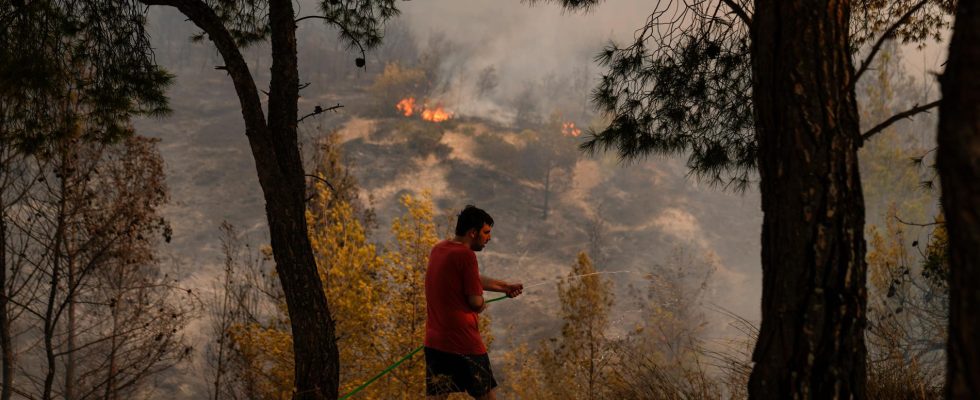full screen
Next
A man tries to put out a fire west of the Greek capital Athens.
1 / 2Photo: Petros Giannakouris/AP/TT
Extreme heat plagues Europe’s destinations. However, it does not seem to stop Swedish tourists – despite the fact that for some groups the temperatures can be downright dangerous.
But the heat is not considered reason enough for cancellation, according to travel companies.
The heat has turned southern Europe into something akin to a giant pizza oven, according to climate scientists. But despite extreme temperatures, Swedes continue to go abroad during July and August, according to travel company TT has spoken to.
– When the weather is uncertain at home in Sweden, the demand to travel abroad increases. You want to get to the Mediterranean in any case, says Martina Krantz, press officer at Apollo.
Even TUI testifies that the booking pressure is similar to previous summers. The travel company has sent text messages with information and advice to travelers in areas where the heat is at its worst.
– We refer to local advice and recommendations. You can also ask the hotel how to deal with fire risk and heat, says communications manager Adam Györki.
No cancellation
If there are health reasons, confirmed by a doctor, travelers can make an insurance claim if it is the heat wave that stops one from travelling. But otherwise, it is not a valid reason for refunding the trip, according to TUI.
– Heat or a heat wave is no reason to cancel, says Györki.
The same applies at Apollo.
– It is only when there is a real advice against travel that we allow a refund. Hot weather is not part of it, says Krantz.
SOS International is an emergency organization for people who need help during trips abroad. They are seeing an increase in calls from travelers in Greece, where wildfires are raging in the wake of the heat.
– It is people who are wondering what to do if the fires spread to the area where they are, or people who are close to and in the vulnerable areas who get in touch, says Charlotte Bjerregaard at SOS International.
Replacement?
Travel and insurance companies offer different solutions if the trip is affected by extreme weather, according to the Swedish Consumer Agency. It is important for the consumer to have a dialogue with their travel supplier and examine which conditions apply to rebooking or cancellation.
– If activities are canceled due to the heat, you are entitled to compensation, such as a price reduction, for example, says Hanna Bornstedt, supervisor at the Swedish Consumer Agency.
The Package Travel and Charter Act gives consumers better protection than consumers who only booked scheduled flights.
– Also check if you have cancellation protection for your trip in your home insurance, before you buy extended travel protection, says Bornstedt.
Health effects
For Swedes who are out and about, the high temperatures can be a shock to the body. When it’s hot, the temperature is regulated by increasing blood circulation in the superficial blood vessels, which dilates the vessels so that sweat production increases.
– This in turn increases the load primarily on the heart and leads to fluid and salt losses. If you already have cardiovascular disease, it can be dangerous, says Kristina Sparreljung, secretary general of the Heart-Lung Foundation.
Children, the elderly and other chronically ill people are also extra sensitive.
As a tourist in the heat wave, it is important to pay attention to symptoms such as headaches, dizziness and nausea. To prevent it, you can drink a lot of water.
– Avoid alcohol and caffeine, it’s not very good when it’s very hot.
In addition, it may be a good idea to follow the custom that exists locally in many places and take a siesta in the middle of the day to avoid the strongest sun.
– The siesta exists for the reason that this hot time in the middle of the day is exhausting for the body. So it’s a pretty good idea actually, says Sparreljung.
FACT This is how you can survive a heat wave
Drink plenty of water, even when you’re not thirsty, and eat foods rich in fluids such as vegetables and fruit. Avoid alcohol and caffeine.
Pull down curtains, blinds and awnings to create a cool indoor environment. Air at night when it is cool.
Avoid being outdoors when the sun is strongest in the middle of the day and also avoid physical activity during the hottest hours.
Cool down by taking a cold shower or wrapping a wet towel around your neck.
Use loose-fitting clothes in natural materials.
Be aware of warning signs of heatstroke: increased heart rate and breathing rate, dizziness and abnormal fatigue. Dry mouth and decreased urine output can also be signs of dehydration.
Remember not to throw glass in nature, as it often starts fires in the already overheated countries.
Source: Public Health Agency, Heart-Lung Foundation
Read more
